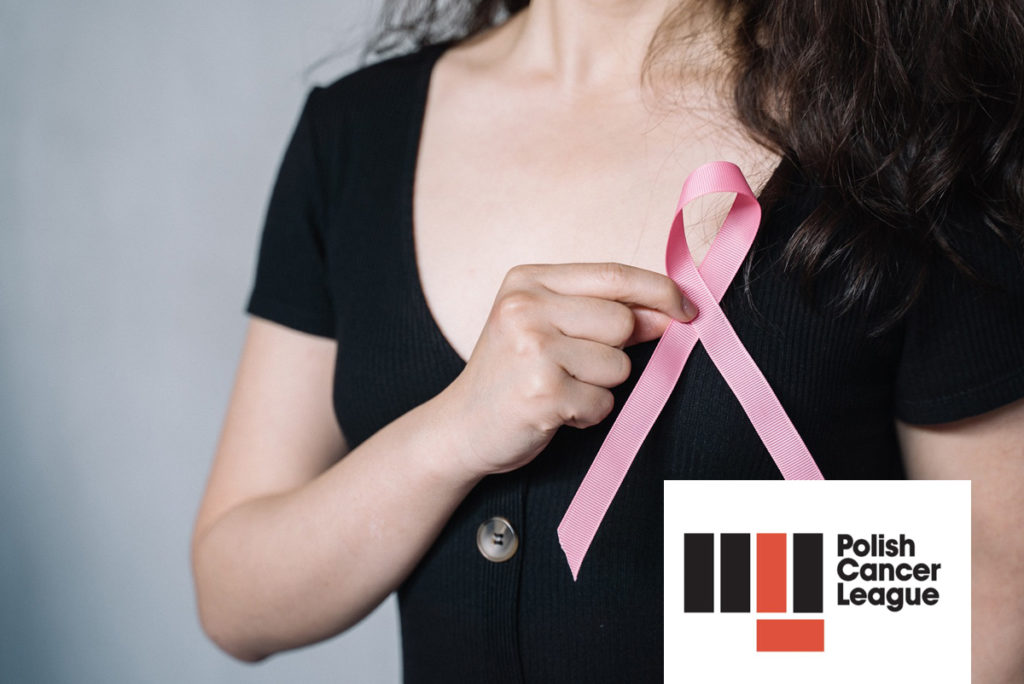Material prepared by experts from the Polish League Against Cancer Foundation
Breast cancer is the most common cancer in women in Poland and in the world. It is estimated that one in eight women will develop breast cancer during their lives. The average age of developing breast cancer is 62, but 20% of all diagnoses occur in women under 50 years old. Moreover, the number of newly diagnosed breast cancers in each age group is increasing every year. Doctors often call for regular screening mammograms. They are recommended every 2 years in the group of women between 50 and 69 years old, in whom the risk of developing the disease is the highest. Early diagnosis of cancer and appropriate treatment significantly improve prognosis, leading to cure in the vast majority of patients. This is the chance of a lifetime.
What increases the risk of breast cancer?
Female sex is the most important risk factor for breast cancer. Importantly, men also get breast cancer. However, it happens much less often – up to 100 times less often. Infection in a man can be a sign of an inherited predisposition and always requires consultation with a geneticist. In general, genetically predisposed, or inherited, cancers are rare and account for about 2.5-10% of all breast cancer cases in women. Carriers of mutations in genes that increase the risk of breast and ovarian cancer (BRCA 1/2, Breast Cancer Gene) are less than 1% of the healthy population.
The effect of hormones on breast cancer development
Early first menstruation and late menopause, the last menstrual period of a woman’s life, increase the risk of breast cancer. This is due to prolonged exposure to sex hormones. Lack of offspring or late birth of the first child (after the age of 35) also increase the likelihood of developing breast cancer. In Europe and Poland, the age at which women become mothers is delayed, which is not a positive phenomenon from the perspective of cancer exposure. It is assumed that during pregnancy and breastfeeding, the epithelial cells of the ducts leading to the breast undergo maturation, which reduces the risk of cancer in the mammary gland.
It is important to know that studies show that oral contraceptives have no effect on breast cancer development regardless of the duration of use or the preparations taken. Such conclusions can be drawn, among others, from the meta-analysis of 54 studies involving 100,239 healthy women and 53,297 women diagnosed with breast cancer In women using contraception or those who had recently stopped taking it, the risk of developing breast cancer was slightly increased and decreased with each year after stopping therapy [Collaborative Group on Hormonal Factors in Breast Cancer. Breast cancer and hormonal contraceptives: collaborative reanalysis of individual data on 53,297 women with breast cancer and 100,239 women without breast cancer from 54 epidemiological studies. Lancet. 1996 Jun 22;347(9017):1713-27. doi: 10.1016/s0140-6736(96)90806-5. PMID: 8656904].
Women who take hormone replacement therapy during menopause enjoy a better quality of life, but they should be aware that taking hormonal preparations for more than 5 years results in an increased risk of breast cancer. This is especially true for estrogen-progesterone preparations.
Lifestyle
It is estimated that even 1/3 of cancers diagnosed after menopause is related to obesity, therefore it is very important to maintain an appropriate body weight, if only by following a proper diet and regular physical activity. The main source of postmenopausal sex hormones is adipose tissue, where androgens are converted to estrogens. Prolonged stimulation with endogenous estrogens, i.e. those produced in the woman’s body, or exogenous, taken from the outside, exposes her, among others, to the development of breast cancer.
Can we protect ourselves from cancer?
There are a number of so-called non-modifiable factors that increase the risk of breast cancer (gender, age of first and last menstrual period, genetic factors), which are beyond our control. However, maintaining an appropriate body weight, limiting consumption of polyunsaturated fatty acids, and avoiding alcohol help to reduce the likelihood of developing the disease. Having offspring at a younger age and breastfeeding for more than 12 months also have protective effects. The continuous increase of newly diagnosed breast cancers is mainly related to the change in women’s lifestyle, late having offspring, unhealthy diet and sedentary lifestyle. Hence, all health-promoting activities reduce the risk of health problems. Not only the incidence of breast cancer, but also, for example, cardiovascular diseases.
Golden rules for breast cancer prevention:
- Get tested regularly:
– get a mammogram every 2 years (age 50-69)
– have regular breast examinations with a doctor (20-49 years old) - Play sports regularly and be physically active
- Maintain a normal body weight (BMI 18.5-25)
- Avoid alcohol
- Eat a healthy and well-balanced diet
- Consider having children before the age of 35
- Breastfeed for more than 12 months
- Do not use hormone replacement therapy for more than 5 years
Read more:
